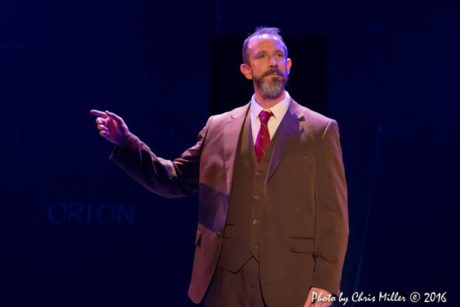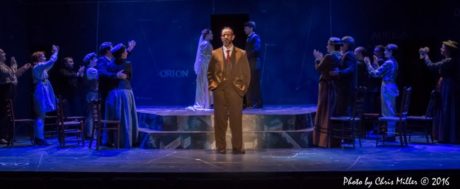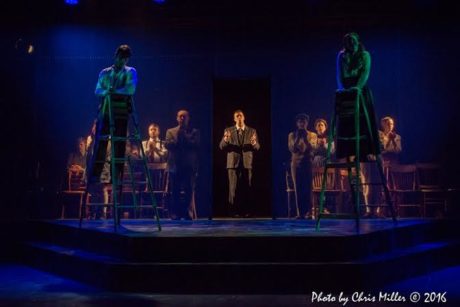In the 1930s, when Thornton Wilder was unhappy with the state of contemporary theater and felt that something had gone wrong, he created a metatheatrical work that would become an American classic. Eagle Theatre’s production of Our Town, directed by Ted Wioncek III, honors the playwright’s inventive style with a presentation that employs a mostly bare stage instead of a curtain and full set, mime instead of props, and actors who create live sound effects instead of signaling pre-recorded ones. And Wilder’s theatrical self-referencing device of a contemplative “Stage Manager”/narrator breaks through the fourth wall, speaking directly to the audience, stepping into an occasional role, and acknowledging throughout his running commentary that this is a play, performed by actors in a theater. The approach, inviting conscious audience engagement, is immediate and impactful, personal and universal, artistic and provocative, as it was intended it to be.

But the Eagle also introduces some changes into its unique version of the 1938 American masterpiece. Though the story told by the Stage Manager and actors in Wilder’s original work takes place from 1901-13, in Grover’s Corners (a fictional small town in New Hampshire), the locale is here changed to the Eagle Theatre’s own home base of Hammonton, New Jersey, from 1905-18, in commemoration of the 150th anniversary of its founding. To the delight of the local audience, the script has been adapted with well-researched references to their town’s history, demographics, and landmarks, which are recounted at length at the beginning of Act I (by Jonathan Fink as Professor Willard, a verbose guest lecturer brought in by the Stage Manager) and sprinkled throughout the entirety of the production.
To help transport audiences into the historical context of the actors’ narrative, the company, in collaboration with Stockton University’s South Jersey Culture & History Center and the Noyes Museum, has created a pre-show exhibition called “Waves of Diversity – An Interactive Experience of Our Progressive History,” which displays preserved photographs and films, clothing, antiques, and other artifacts from Hammonton’s past. The everyday items provide a feeling of accessibility to the community of ordinary Americans we meet in Wilder’s three-act play and follow through their—and all of our–stages of human existence (“Daily Life” in Act I, to “Love and Marriage” in Act II, to “Death and Dying” in Act III), further increasing the spirit of commonality inherent in Our Town‘s message.

Focusing the story on the evolving relationship between young neighbors Emily Webb (Maggie Griffin-Smith) and George Gibbs (Justin Mazzella), the Stage Manager (Charlie DelMarcelle) introduces us to their families and the other inhabitants of their close-knit community. Wioncek’s fine ensemble portrays the characters with an effective balance of seriousness and humor, and with subtlety and understatement, so that Wilder’s traditional archetypes— the male breadwinners (Jared Michael Delaney (Dr. Gibbs); Leonard C. Haas (Mr. Webb), the dutiful housewives and mothers Deborah Jenkins (Mrs. Gibbs); Mary Lee Bednarek (Mrs. Webb), the gossiping busybody (Kirsten Quinn as Mrs. Louella Soames), and the town drunk (Tim Rinehart as the church choir master and organist Simon Stimson)–do not become merely outdated stereotypes, but the straightforward embodiments of the old-fashioned social structure, values, and mindset of an earlier era.
One of the funniest moments–and most enjoyable from a 21st century perspective–comes when Haas, as the father of the bride, relays to his nervous future son-in-law the questionable (and now sexist) advice he was given as a young groom, and then quickly admits that he didn’t follow it. Quinn and Rinehart, despite their characters’ flaws, remain sincere and likeable, Griffin-Smith and Mazzella are a delight as Emily and George, as we see them mature from children into responsible adults, and DelMarcelle delivers the Stage Manager’s directions with firm guidance and relays his bittersweet meditations on the meaning of life, and the importance of treasuring every person, second, and detail while we still can, with quiet introspection and thought-provoking profundity.
The play’s overall mood of nostalgia is enhanced by Sean Quinn’s period-style costumes, with long skirts and aprons for the women and three-piece woolen suits for the men, and by vintage wooden chairs, tables, and ladders that are easily moved around the space for different scenes.
The sparse set design by Chris Miller and Wioncek, executed by scenic artist Brooke Murray, also includes a two-level platform at center stage, covered with reproductions of a map of Hammonton based on aerial photographs from the 1920s, and a blue scrim backdrop decorated with the heavenly constellations—a visual reference to the Stage Manager’s concluding observations on the stars and the eternal. Wioncek’s expansive blocking uses the aisles of the theater and rows of chairs behind the scrim for the ensemble to enter and to exit the stage area and to deliver the live sound effects by David Pierron, and Miller’s focused lighting imparts an unearthly pallor to the dead, as they become increasingly detached from life.
It all works in Eagle Theatre’s delivery of a compelling vision of Our Town.
Running Time: Approximately two hours, with two intermissions.

Our Town plays through Sunday, June 26, 2016, at Eagle Theatre – 208 Vine Street, in Hammonton, NJ. For tickets, call the box office at (609) 704-5012, or purchase them online.




